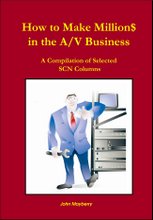Appalling.
The record industry has unsuccessfully attempted to stamp out piracy by litigating against individuals for five years now. In that time, the RIAA has threatened more than 30,000 people with litigation, racking up millions in legal fees in the process, but without appearing to make any dent in copyright infringement.
In casting a wide net for non-commercial file-sharers, the RIAA has also disrupted the lives of innocent Web users and is now itself facing a class-action lawsuit brought by an exonerated defendant.
But none of that is slowing down the RIAA. On the contrary, the group is growing even more aggressive in its litigation efforts.
The latest news is that the group has rejected a judge's suggestion that the organization allow Whitney Harper to pay $7,400, or $200 a song, to settle allegations that she shared 37 tracks on Kazaa four years ago, when she was just 16. The judge previously ruled that Harper was an "innocent infringer" because she didn't realize she was doing anything illegal, and because Kazaa didn't warn users that music available on its network was pirated. While those facts might not be enough to exonerate her, they can reduce damages to something less than the usual $750 minimum.
But the RIAA is determined to extract at least $750 per track from her and has requested a trial on the issue of damages.
And that's not the extent of the RIAA's militancy. The group is now going after the defense attorney Ray Beckerman, asking that a federal district court judge impose sanctions for his "vexatious" conduct.
The RIAA appears especially aggrieved by Beckerman's blog, The Recording Industry vs. The People, where he posts publicly available motions in lawsuits involving the organization.
"Defendant's counsel has maintained an anti-recording industry blog during the course of this case and has consistently posted virtually every one of his baseless motions on his blog seeking to bolster his public relations campaign and embarrass plaintiffs," the group wrote in its motion for sanctions.
That motion, like others filed by the RIAA, remains available on Beckerman's blog.
About This Blog:
Integrating complex electronic projects requires industry individuals keep abreast of the latest technological trends.
Some things are important, many ironic, others outright frauds, and a few are just so very wrong. Occasionally the original technological goal and downstream results are in hilarious conflict.
Usually "the latest trends" go back fifty to one hundred years in their development and are only new to the uninformed. In most every case, the ancients have truly stolen our inventions!
As far as we know, this is the only place that collects them and lets you celebrate them for yourself. We'd love to hear from you if you have something we've missed!
Some things are important, many ironic, others outright frauds, and a few are just so very wrong. Occasionally the original technological goal and downstream results are in hilarious conflict.
Usually "the latest trends" go back fifty to one hundred years in their development and are only new to the uninformed. In most every case, the ancients have truly stolen our inventions!
As far as we know, this is the only place that collects them and lets you celebrate them for yourself. We'd love to hear from you if you have something we've missed!
Blog Archive
-
▼
2008
(332)
-
▼
September
(19)
- Very, Very Impressive
- Google Dream Phone from TMobile
- RIAA Wants $750 per Downloaded Track
- Cool Ferrofluid Video
- Wilmington TV Switch Discovers Flaw
- Best Buy Nabs Napster for $121 Million
- Pink Floyd's Rick Wright Dead at 65
- Microsoft Surface Video
- End of the Nation State?
- LP's Making a Comeback
- Next Generation Aircraft Carrier Contracted
- Live Nation Signs Deal with SMG
- Sony Introduces 240Hz LCD HDTV Line
- Licensing an IEEE Standard?
- Megawatt Laser on a 747
- Disney Uses Siemens for Ride Safety Systems
- iPhone Sound Level Meter
- Wilmington Goes Digital Early
- Don LaFontaine Dies
-
▼
September
(19)


